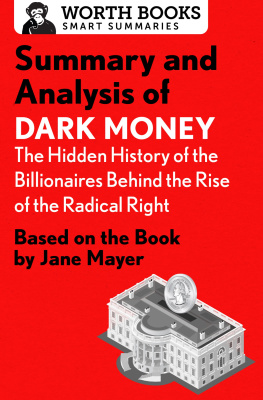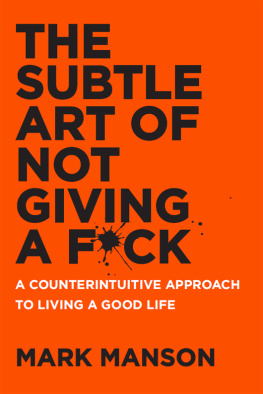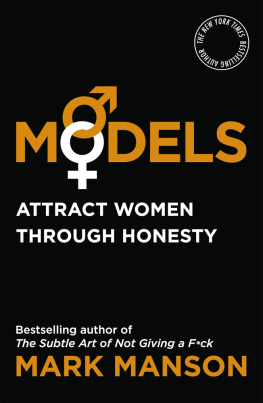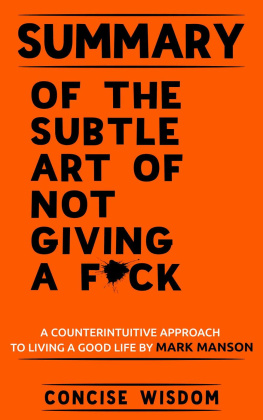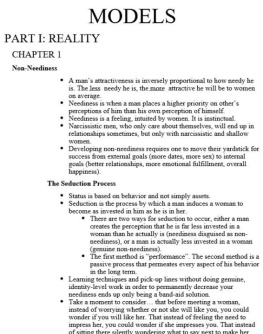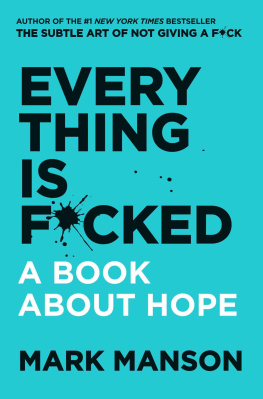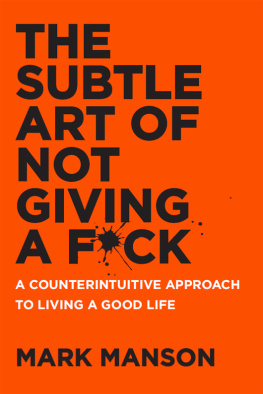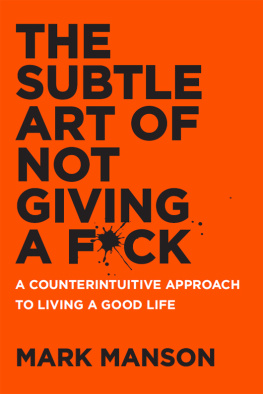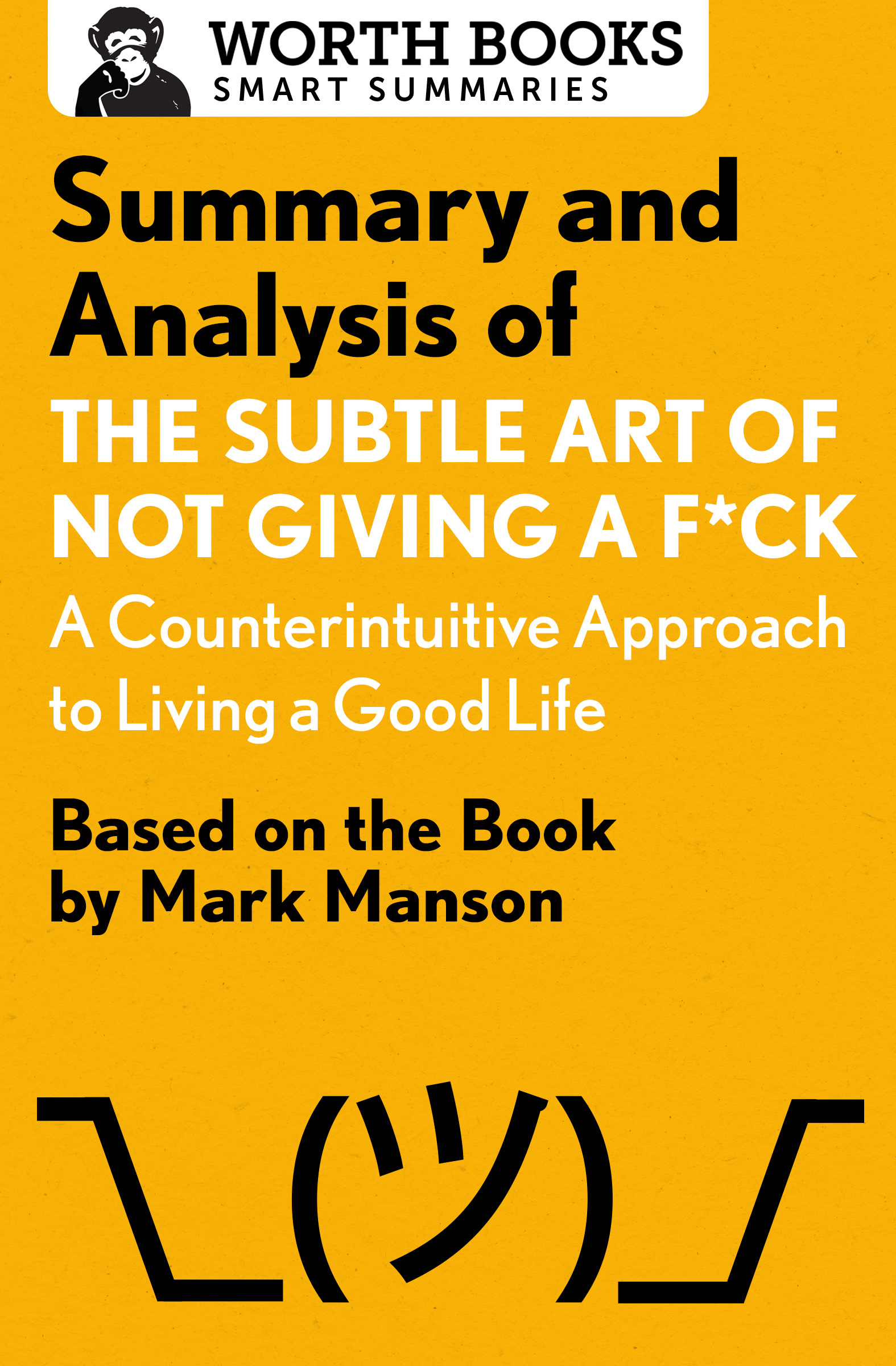Summary and Analysis of
The Subtle Art of Not Giving a F*ck
A Counterintuitive Approach to Living a Good Life
Based on the Book by Mark Manson

Contents
Context
The Subtle Art of Not Giving a F*ck is a reaction to traditional self-help books, which typically prescribe one of three things: a) staying positive no matter what; b) building up your self-esteem by saying nice things about yourself; or c) adopting the teachings of an exotic belief system or cultlike figure. Mark Manson doesnt agree with any of these approaches. Hes neither a self-appointed guru nor positivity pusher. Rather, hes merely a (relatively) young guy with decent ideas worth examiningparticularly as they relate to other young people trying, in vain, to figure out their lives. This is a modern book; Manson is both self-aware and sarcastic, two traits closely associated with millennials. Nevertheless, it references a number of different schools of philosophy, resulting in a timeless work that appeals to curious people of all ages.
Overview
Mark Manson wants you to know its okay to feel bad. Instead of denying your disappointments and forcing yourself to put on a happy face, go ahead and acknowledge that your situation sucks. Done? Good. Now its time to move on.
Painful truth is at the heart of Mansons millennial manifesto, The Subtle Art of Not Giving a F*ck , which could alternatively be titled How to Make Peace with Yourself or The Subtle Art of Acceptance. Manson argues that living successfully comes from knowing when to give a fuck. If were constantly outraged, upset, or disappointed, this means were giving up way too much of our precious supply of fucks. Most of us cant change our disappointments, but we can decide how we weather them.
Manson has no time for conventional self-help methods, least of all advice from the self-esteem or positivity movements. We are all actually pretty average, says Manson, but accepting our lack of awesomeness can be liberating. It frees us from trying to live up to the insane and unrealistic standards that wed expect remarkable, unique people to have. It strips us of our sense of entitlement, a major cause of aforementioned disappointments and anxieties. As for positivity in the face of so much suckage, Manson thinks thats just silly. Positivity for the sake of positivity is hollow and makes us miserable, because it forces us to deny our true feelings. When we acknowledge that something stinks, we can get past it.
The Subtle Art of Not Giving a F*ck is an instruction manual for letting go. Manson exhorts us to face reality, as unpleasant as it may be. His philosophy actually incorporates many aspects of Buddhist thought, which prizes acceptance and nonresistance as virtues. Strength comes from acceptance, and once we are strong enough, negative events just dont have the same power over us that they used to.
Mansons book is also a call to reevaluating our beliefs. Much of our anxiety stems from our unthinking acceptance of values that weve absorbed since childhood. When we scrutinize them deliberately, we can determine whether or not they actually express who we are today. If our values have changed, Manson has a solution: Just dont give a fuck.
Summary
Chapter 1: Dont Try
Manson explains what he means by not giving a fuck, and he clarifies the books purpose. Not giving a fuck isnt about not caring about anythingthat would make you a psychopath or an insecure poseurrather, his challenge to the reader is to think much more carefully about the things the reader actually should care about (or, in Manson-speak, give a fuck about). Manson observes that each of us is constantly bombarded with images of success: a huge home in a trendy city, professional success, a hot spouse, a cool car, a perfect lawn, an envy-stoking Facebook personality, and so on. When we take in these images, we feel bad about ourselves, because they remind us of our own perceived deficiencies. On top of this, conventional self-help says that if we just stay positive and believe in ourselves (and other irritating platitudes) everything will work itself out: Well be rich, famous, married, ripped, respected, and adored by children everywhere.
Not so, says Manson. The more we try to psych ourselves up artificially, the worse off well actually be. Its much more productive to be okay with feeling bad about certain thingsand then let the feeling go. Theres such a stigma, at least in traditional self-help, about accepting negativity (otherwise known as facing the truth), but by giving ourselves permission to admit that something sucks and then move onin Mansons words, to take the view I feel like shit, but who gives a fuck?the objects of our unrealistic desire lose some of their power. We care less about them.
The fact that we feel bad about so many things shows that we give too many fucks about too many things. Better, then, to accept our disappointments and focus our time and energy on things we can do. To not give a fuck is to accept our circumstances and our lives. It doesnt mean that weve given up or that we shouldnt try to improve our station; it simply means that just because we dont have the best car, the most fulfilling job, or the most Instagram-worthy party pictures, our lives arent complete failures. When we give fewer fucks about achieving wildly unrealistic and unlikely goals, we free ourselves from our own exhausting expectations. And, ironically, the peace we gain from this process will provide more clarity. It will show us which things we should truly give a fuck about.
Need to Know: Not giving a fuck is about letting go of the stuff you cant control. Focusing your concern (fucks) on things that you can do, no matter how small, is much more productive.
Chapter 2: Happiness Is a Problem
Here, Manson argues against popular conceptions of happiness. He opens the chapter with an instructive story about the Buddhas life and his insights. The Buddha (who was a real-life figure) grew up in a palace where all of his needs were met and everything was always harmonious and beautiful. One day, however, he decided to leave the palace and explore the outside world. He was absolutely shocked to see people suffering, a state of being that had been hidden from him all of his life. The experience was unsettling to say the least. He left his family, never to return, in search of lifes meaning. He tried living in abject poverty for a while, but that didnt teach him muchexcept that living in abject poverty really, really sucks, and that doing it voluntarily, for no greater purpose, is silly. After some time, he came to a realization (one of the central tenets of Buddhism): Life itself is a form of suffering. This is true for everyone, no matter his or her circumstances. The important corollary is that pain and loss are inevitable and we should let go of trying to resist them.
Heres how resistance looks in the real world: For many people, happiness has a definable endpoint. They believe that happiness is algorithmic, that it can be worked for and earned and achieved as if it were getting accepted to law school. If I achieve X, then I can be happy. If I look like Y, then I can be happy. If I can be with a person like Z, then I can be happy. This is completely wrong, Manson argues, because happiness is a fleeting state. Once we solve our momentary happiness algorithm, a new algorithm will inevitably appear, whispering to us that yeah, X is okay, but if we could just achieve something even better, then wed really have it made. Everything is relative. No doubt there are objectively wealthy people who fret about money even though they have more than people with true money problems could ever imagine. This constant state of dissatisfaction, of daydreaming about better, is part of human nature, says Manson, channeling the Buddha.




